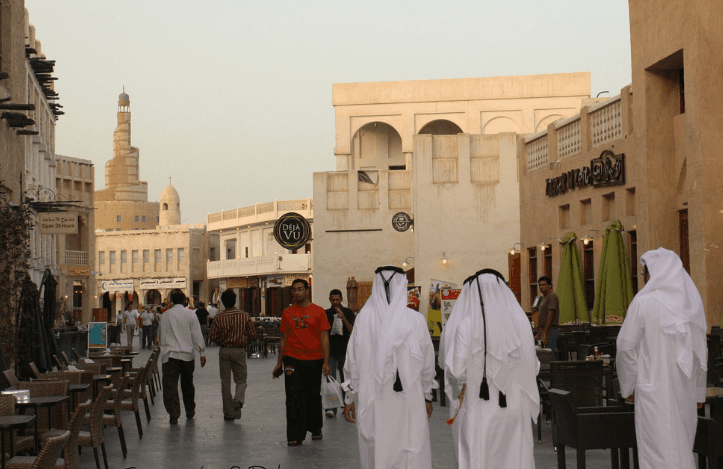
Relations between Qatar and its neighbors along the Gulf have been fraught for years. The tiny oil kingdom and the United Arab Emirates, for example, have been uneasy neighbors since Qatar declined to join the UAE in the early 1970s, instead deciding to go at independence alone. Nevertheless, the decision by several Arab nations to sever diplomatic ties over allegations of Qatar’s ties to terrorism with this country of 2.5 million people has roiled diplomatic channels as well as the equities markets.
And while many analysts are speculating about the ongoing power play between forces such as Iran, Saudi Arabia and the U.S., the sudden isolation of Qatar will make life even more difficult for its hundreds and thousands of expatriate workers, many of whom are building glitzy new stadia for the 2020 World Cup. Food will be coming into the country at a slow trickle, if at all, and it will be difficult to leave – as well as near-impossible for human rights activists working on the sly to visit.
The rapid loss of transport links should serve as just the first lesson to governments that if they are ever going to develop long term resilience plans, the time to start that was yesterday.
Media reports have given copious amounts of coverage of how the closure of Qatar’s sole land border with Saudi Arabia has led to panic buying in supermarket chains such as Carrefour. And not only has the country’s flagship carrier, Qatar Airways, been banned from landing in nations such as Bahrain, Saudi Arabia and the UAE, the country has lost almost all of its adjacent airspace. Qatar Airways’ planes, in effect, could be grounded as long as this diplomatic crisis festers.
What no one is asking is how cutting off Qatar from most of the world will have an impact on the workers who have toiled on Qatar’s new buildings and sports infrastructure. The documentation of human rights violations piled on construction workers, most of whom are from Nepal and India, has been ongoing for several years. But as attention shined on the first state-of-the-art air conditioned stadium’s opening, organizations including Amnesty International have accused the Qatari government of looking the other way while construction companies have made little progress addressing accusations of workplace abuses.
Complaints have included steep recruitment fees, working excessive hours, fear of reporting health and safety violations and the confiscation of passports. In a nation where per capita income is around $130,000, these workers make as little as $350 a month (less than the average wage in Somalia, as BBC pointed out), and the hundreds of thousands of guest workers living in Qatar face a frightening future as few people are allowed to fly in or out. Will any of the riches that Qatar has amassed, the amount of which reportedly could allow its citizens to ride out this storm, be invested at all to shield workers from what could be several grim weeks, if not months?
One thing these poor and overworked workers share with Qatar’s wealthy nationals is they will all suffer from any lack of sustainability or long-term resilience plans. Qatar’s sustainable development plans have been at most token efforts encourage businesses to be more “sustainable” or to welcome some electric cars on its roads. Some building developments, such as Msheireb in downtown Doha, have attempted to meld green building and celebrate the country’s heritage. But the country’s tenuous supplies of fresh water and food have never been addressed, surprising considering the prickly relations it had long had with its neighbors.
In the case of food security, Qatar’s plan to simply buy and lease farmland in other countries will now exact a toll on citizens no matter how generous their bank accounts may be. Saudi Arabia, the breadbasket (and produce stand) of much of the Gulf region has closed its border with Qatar, which sources 40 percent of its food from its much larger neighbor. Iran has reportedly said it could fill that gap, but ships take about 12 hours to cross the Gulf – hardly any comfort to citizens and expatriates who have already cleaned out the country’s supermarket shelves. Qatar imports 99 percent of its food needs; its moves to invest across lands as far away as Brazil is of small consolation if those products cannot enter Qatar’s borders in the first place.
Arabs living in the Gulf have long said that oil has been both a blessing and a curse. In the case of Qatar, which by most accounts has the world’s third or fourth largest reserves of hydrocarbons, its wealth will offer few blessings as this diplomatic drama unfolds. And the country’s poorest and most vulnerable residents, who do not even enjoy the benefits of citizenship, may pay the largest price whether they are stuck, or fleeced out of what little they have in the event they are allowed to return home.
Image credit: Jan Smith/Flickr

Leon Kaye has written for 3p since 2010 and become executive editor in 2018. His previous work includes writing for the Guardian as well as other online and print publications. In addition, he's worked in sales executive roles within technology and financial research companies, as well as for a public relations firm, for which he consulted with one of the globe’s leading sustainability initiatives. Currently living in Central California, he’s traveled to 70-plus countries and has lived and worked in South Korea, the United Arab Emirates and Uruguay.
Leon’s an alum of Fresno State, the University of Maryland, Baltimore County and the University of Southern California's Marshall Business School. He enjoys traveling abroad as well as exploring California’s Central Coast and the Sierra Nevadas.














